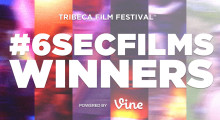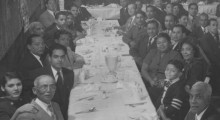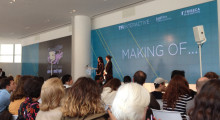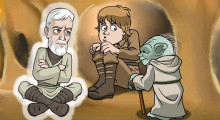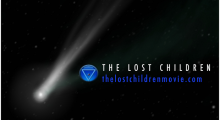Transmedia
Filmmaking - Transmedia
-
Big Data and the 25 Best Film Schools

Big Data — the term is everywhere right now. Sometimes used as a shorthand for the companies that are in the business of collecting, aggregating and sifting through large data sets (often comprised of personal info), it more properly refers to the data sets themselves — collections of information so gigantic they require advanced technologies to interpret. There’s much creepy potential in Big Data, but it is here to stay. The question, then, is whether the technologies of Big Data can be marshaled for progressive and creative goals. At Arts Fwd, Erinn Roos-Brown argues that arts organizations can learn from […]
-
Beyond: Two Souls at the Tribeca Film Festival

The distance between video games and cinema has been shrinking for years. Nowhere was this more obvious than in the presentation of Beyond: Two Souls last Saturday during the Tribeca Film Festival’s closing weekend, an event billed as the first time a video game has ever been shown in a film festival. Certainly in the packed SVA theater, past the red carpet for actors like Elliot Page and after the enthusiastic introduction by Tribeca’s Chief Creative Officer Geoffrey Gilmore, it felt like a convergence of the two media that we haven’t seen before. This isn’t a game based on a […]
-
Enter Vine: Crafting the 6-Second Film

Since Vine was launched a little less than a year ago it’s gotten a fair amount of attention from the technology press but not as much, it seems, from filmmakers. The premise, that all films must be limited to six seconds, doesn’t lend itself to narrative films; it has, rather, been a gathering place for stop-motion animators, encouraged by its use of iOS device screens as the camera shutter, and, more famously, porn. But the app has proven nearly as popular as Twitter, which bought it last October, and just this month it became the most-downloaded free app in the […]
-
The New Digital Storytelling Series: Vivek Bald

In the eighth part of Filmmaker‘s interview project with prominent figures from the world of transmedia, conducted through the MIT Open Documentary Lab, Vivek Bald, filmmaker, Associate Professor of Writing and Digital Media at MIT and a member of the MIT Open Documentary Lab, answers our questions. Bald’s ongoing project, Bengali Harlem, documents the history of two little-known groups of South Asian immigrants. For an introduction to this entire series, and links to all the installments so far, check out “Should Filmmakers Learn to Code,” by MIT Open Documentary Lab’s Sarah Wolozin. MIT Open Documentary Lab: How did you become a digital storyteller? Were there […]
-
Tribeca Film Institute’s Interactive Conference

There’s no good way to summarize the plethora of information presented last Saturday at TFI Interactive, a full-day conference held, for the second time, during the Tribeca Film Festival. Organized by the omnipresent Ingrid Kopp (who was recently interviewed by the MIT Open Documentary Lab), the day took place at the IAC Building in lower Manhattan, not far from most of the festival’s screenings and the Storyscapes interactive exhibits that Kopp also curated. Over 20 presentations covered dozens of individual projects, discussed entities like Kickstarter, the NFB, and IDFA DocLabs, and included panel discussions on creating adventure video games (think The […]
-
Storyscapes: Tribeca Goes Interactive

This image is from Empire Uncut, part of the Star Wars Uncut project and one of the five projects at the Tribeca Film Festival’s first juried exhibit of interactive video projects, which ran this week at the Bombay Sapphire House of Imagination on Varick Street. TFI has been supporting digital, transmedia, and multimedia projects for years through programs like its New Media Fund and hackathons, and now TFI’s Director of Digital Initiatives Ingrid Kopp (who was recently interviewed by Filmmaker) has found a way to bring some projects into a physical space to coincide with the film festival in lower […]
-
The New Digital Storytelling Series: Ingrid Kopp

In the seventh part of Filmmaker‘s interview project with prominent figures from the world of transmedia, conducted through the MIT Open Documentary Lab, Ingrid Kopp, Director of Digital Initiatives at Tribeca Film Institute, answers our questions. Kopp oversees the TFI New Media Fund, runs Tribeca Hacks and produces TFI Interactive during the Tribeca Film Festival. For an introduction to this entire series, and links to all the installments so far, check out “Should Filmmakers Learn to Code,” by MIT Open Documentary Lab’s Sarah Wolozin. MIT Open Documentary Lab: How do you see people making the transition to digital interactive storytelling? Kopp: I think people have […]
-
POV’s Third Nonfiction Transmedia Hackathon

The most encouraging aspect of POV’s third hackathon, which wrapped with a public presentation Sunday night, was the social commitment of the five projects. When they hit close to home, events like Monday’s bombing in Boston can make you step back and reevaluate your work, its purpose and meaning. So it was gratifying, a day earlier, to see how committed the hackathon teams were to remedying some kind of societal problem, including some situated half a world away. Over two days the participants worked together to use new technologies to make real strides against issues like homelessness, war, and the […]
-
The New Digital Storytelling Series: Brett Gaylor

In the sixth part of Filmmaker‘s interview project with prominent figures from the world of transmedia, conducted through the MIT Open Documentary Lab, Brett Gaylor, Senior Director of Mozilla’s Webmaker initiative (including Mozilla PopcornMaker and Popcorn.js) answers our questions. Gaylor has previously been a member of the EyeSteelFilm documentary production company, the founder of Open Source Cinema and the web producer of Homeless Nation. For an introduction to this entire series, and links to all the installments so far, check out “Should Filmmakers Learn to Code,” by MIT Open Documentary Lab’s Sarah Wolozin. MIT Open Documentary Lab: How did you become a digital […]
-
The New Digital Storytelling Series: Mark Harris

Mark Harris is a filmmaker and software architect. Mark writes software for gameplay, storytelling, and transmedia. Mark was a mentor at the first StoryCode StoryHack, and creative technologist on Lance Weiler’s Pandemic 1.0. Mark is also an alumnus of the IFP Narrative Lab. Mark’s transmedia project, The Lost Children, had its New York City premiere in Jan 2013 at Film Society of Lincoln Center, with a feature film and live immersive experience. In the Fall of 2012, Mark wrote his first immersive play for Epic Theater Ensemble, and in Spring 2013, Mark joins the hybrid studio/technology company Murmur. MIT Open Documentary Lab: How did you […]


